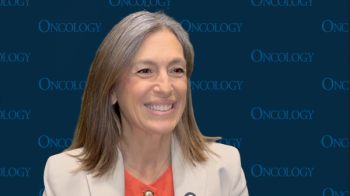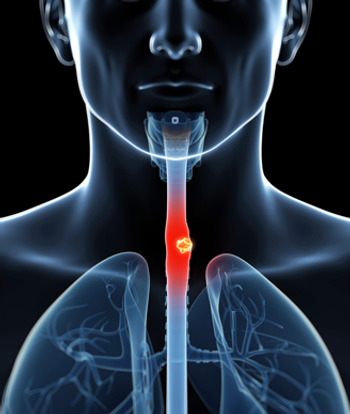
Oncology NEWS International
- Oncology NEWS International Vol 8 No 2
- Volume 8
- Issue 2
Irinotecan Active in Advanced NSCLC, Esophageal Cancer
NEW YORK-Preliminary data presented at the Chemotherapy Foundation Symposium XVI suggest that the toposiomerase I inhibitor irinotecan (Camptosar) in combination with other chemotherapy agents may be effective in multiple tumor types, including advanced non-small-cell lung cancer (NSCLC) and advanced esophageal cancer.
NEW YORKPreliminary data presented at the Chemotherapy Foundation Symposium XVI suggest that the toposiomerase I inhibitor irinotecan (Camptosar) in combination with other chemotherapy agents may be effective in multiple tumor types, including advanced non-small-cell lung cancer (NSCLC) and advanced esophageal cancer.
Camptosar is approved for use in patients with metastatic colorectal cancer whose disease has recurred or spread after standard chemotherapy .
In a phase II study at Memorial Sloan-Kettering, 36 patients with metastatic or recurrent esophageal cancer received weekly irinotecan (65 mg/m²) and cisplatin (Platinol) (30 mg/m²) for 4 weeks followed by a 2-week break. None of the patients had received prior chemotherapy or radiotherapy, and only two had undergone esophagectomy.
David Ilson, MD, reported that this combination achieved a 58% response rate (21/36), including 2 complete responses. Of the 25 patients who reported dysphagia before treatment, 22 (88%) had resolution or improvement of their symptoms after treatment. Also, stable quality of life was maintained during treatment as assessed by the EORTC QLQ-C30.
The most commonly reported grade3-4 toxicities were neutropenia (30%), diarrhea (11%), nausea and vomiting (6%), and fatigue (3%).
The preliminary data suggest that a weekly regimen of cisplatin and irinote-can has promising activity in esophageal cancer with relatively little toxicity and good palliation of dysphagia, he said. Phase II/III comparative trials against other cisplatin or paclitaxel [Taxol]-containing regimens are indicated.
Advanced NSCLC
The symposium included reports of two trials of irinotecan in NSCLC. Alan Sandler, MD, of Indiana University School of Medicine, reported data from a phase I/II multicenter study in which a three-drug combination was given in a sequence of paclitaxel, 175 mg/m² over 3 hours; carboplatin (Paraplatin), AUC 5 over 0.5 hours; and escalating doses of irinotecan (40 to 125 mg/m²) over 1.5 hours, with all drugs given once every 3 weeks. The median number of cycles given was 6.
The 31 patients, all with stage IIIB/IV NSCLC, had a response rate of 64.5%, including two complete responses, and half were alive at 1 year, with a median survival of 16.1 months. Adverse effects included diarrhea, neuropathy, neutropenia, and infection.
While further studies are ongoing, these trials suggest that combination therapy with Camptosar, paclitaxel, and carboplatin may be effective in advanced or metastatic non-small-cell lung cancer and may help improve overall survival rates, Dr. Sandler said.
Russell F. DeVore III, MD, director of Thoracic Oncology, Vanderbilt University Cancer Center, reported results using the Saltz regimen (developed at Memorial Sloan-Kettering)cisplatin (30 mg/m²) plus irinotecan (65 mg/m²) given weekly for 4 to 6 weeks.
This multicenter phase II trial of 50 chemotherapy-naïve patients with advanced NSCLC showed a 49% response rate (18 of 37 evaluable patients), with median survival of 44 weeks. The most commonly reported adverse events included manageable symptoms of diarrhea, neutropenia, vomiting/nausea, and neurosensory deficit.
Overall, this study showed that a weekly cisplatin/Camptosar regimen appears to be active in patients with non-small-cell lung cancer, he said.
Articles in this issue
about 27 years ago
Paclitaxel Plus Mitoxantrone for Poor-Prognosis Breast Cancerabout 27 years ago
Pros and Cons of Different Approaches to Chemoradiationabout 27 years ago
Less Cardiotoxicity With Liposomal Doxorubicinabout 27 years ago
Doxorubicin Appears to Change Natural History of HER-2+ Cancer’sNewsletter
Stay up to date on recent advances in the multidisciplinary approach to cancer.











































